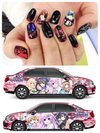O-hisashiburi desu minna-san. I was offline for a while, but now I am back. I have some questions; I hope anyone of you can answer them.
1. I can't clearly see how the kanji for the following words is written: (ringo, kasen (underline), and senpai). What I mean is, for example, how many "lines" are running through the "rectangle" in "senpai" (I apologize if I am using any incorrect terms)?
2. Mainen or Maitoshi--which one is correct?
3. Does the kanji for "shi/ito (thread)" share a component with the kanji for "shi/kami"?
4. Is there any way to tell when Naze or Nande should be used?
5. I read that "kashira" is only used by women. However, in some anime, I have heard male characters using it? Am I wrong, or is there some rule I am not aware of?
6. I heard Lelouch using "wa ga"--I think it means "My"--am I correct?
I also heard him referring to his older brother as "Ani-ue"--does this "ue" refer to the kanji and is therefore used to give his brother respect?
7. The word "gambaru" has an "m" in it--How can I write this in hiragana?
Finally, does anyone know a site where the radicals for each kanji are given? I was using about.com, but they are having technical difficulties.
Thank you everyone and take care. Season's Greetings to all!!

